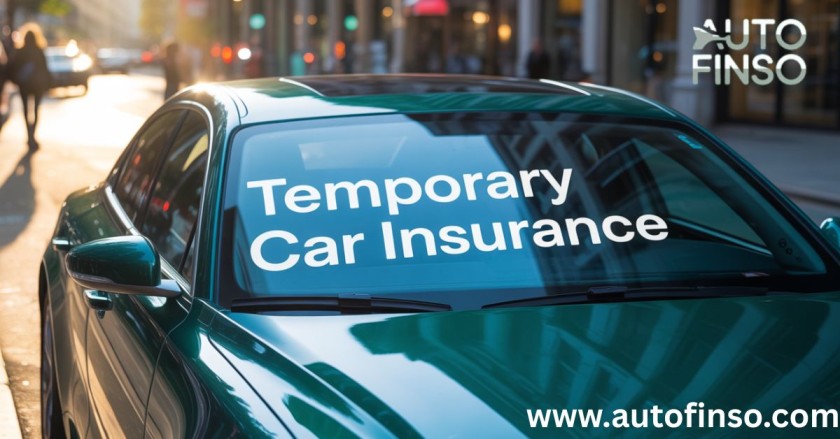Introduction
Temporary car insurance, also known as short-term car insurance, provides vehicle coverage for limited periods ranging from a single day to several months. Unlike standard auto policies that typically run for six months to a year, temporary coverage is designed for specific situations where you need protection for a brief time.
While standard auto policy options offer comprehensive long-term protection with predictable premiums and renewal cycles, temporary car insurance addresses immediate, short-term needs. This type of coverage generally spans anywhere from one day to a few months, making it ideal for unique circumstances that don’t warrant a full-term policy commitment.
What is Temporary Car Insurance?
Temporary car insurance is a specialized form of auto insurance that provides coverage for vehicles on a short-term basis. This type of car insurance policy can include the same protections as standard coverage, such as liability insurance, collision coverage, and comprehensive coverage, but for much shorter durations.
The coverage typically ranges from daily car insurance for single-day needs to weekly car insurance for short trips, or monthly car insurance for extended temporary situations. Temporary coverage proves particularly useful when you’re driving a vehicle not owned by you, such as when borrowing a friend’s car, using a rental vehicle, or test driving a potential purchase.
Key features of temporary car insurance include:
- Flexible duration options
- Coverage for liability, collision, and comprehensive protection
- Protection when driving vehicles you don’t own
- Short-term solutions for specific situations
Who Needs Temporary Car Insurance?
Several scenarios make temporary car insurance a valuable consideration:
Borrowing a Vehicle
When borrowing a vehicle from friends or family members, you may need additional protection beyond what the owner’s policy provides. Temporary coverage ensures you’re adequately protected without affecting the owner’s insurance rates or coverage limits.
Renting a Car
While rental car companies offer insurance options, temporary coverage through your own provider or specialized short-term policies might offer better rates or more comprehensive protection than rental company insurance.
Test Driving a Vehicle
When test driving a vehicle you’re considering purchasing, especially from private sellers, temporary coverage protects you during the evaluation period before you commit to a purchase and arrange permanent insurance.
Moving or Traveling
Extended trips or relocations often require driving unfamiliar vehicles or using rental cars for weeks at a time. Temporary insurance ensures continuous protection during these transitional periods.
Sharing Driving Responsibilities
In situations where multiple people share driving duties for a vehicle they don’t own, temporary coverage provides protection for each driver without the complexity of permanent policy changes.
Vehicle in Storage
If you own a vehicle that you’re not regularly driving, consider suspending specific coverages like collision rather than canceling your policy completely. This approach maintains your insurance relationship while reducing costs during storage periods.
Expert Tip: Instead of completely canceling coverage, work with your insurance provider to suspend specific coverages. This strategy maintains your policy relationship and can save money while protecting against risks like theft, vandalism, and damage from falling objects during storage.
Can I Purchase Daily, Weekly, or Monthly Coverage?
The availability of true short-term car insurance presents significant challenges in today’s insurance market. Most major insurers don’t offer genuine temporary car insurance policies, making it difficult to find legitimate daily, weekly, or monthly coverage options.
The Reality of Short-Term Insurance Availability
Traditional insurance companies typically require minimum policy terms, usually six months to a year. This limitation exists because:
- Administrative costs make very short-term policies expensive to manage
- Risk assessment requires longer periods to be profitable
- Regulatory requirements often mandate minimum coverage periods
Beware of Insurance Scams
MarketWatch and other financial publications have warned consumers about insurance scams targeting people seeking short-term coverage. Fraudulent companies may promise temporary policies but fail to provide actual coverage when needed. Always verify that any insurance provider is properly licensed and regulated in your state.
Alternative Solutions
While traditional temporary insurance may be limited, several alternatives exist:
Pay-as-you-go insurance programs offer flexible coverage based on actual usage rather than fixed time periods. These programs track your driving habits and adjust premiums accordingly, providing a more flexible alternative to standard policies.
For monthly insurance needs, you might need to purchase a standard auto policy with the understanding that you can cancel it after the minimum required period, though this approach may result in cancellation fees.
Is There Short-Term Insurance for Cars I Don’t Own?
Insurance for vehicles you don’t own requires different approaches depending on your specific situation:
Added to Owner’s Policy
The most straightforward option involves being added as a temporary driver to the vehicle owner’s existing policy. This approach provides immediate coverage and is often the most cost-effective solution for borrowing a vehicle.
Rental Company-Provided Insurance
When renting a car, rental companies offer various insurance options including liability insurance, collision coverage, and comprehensive coverage. While convenient, these options are often more expensive than alternatives.
Extension of Personal Auto Policy
Many standard auto policies include coverage that extends to rental cars when you’re traveling. Check with your insurance provider to understand what protection your current policy offers for rental vehicles.
Credit Card Rental Coverage
Many credit cards provide rental car coverage when you use the card to pay for the rental. This coverage typically includes collision and comprehensive protection but may not include liability insurance. Always review the specific terms and limitations of credit card rental coverage before relying on it as your primary protection.
Where Can I Get Temporary Car Insurance?
Finding legitimate temporary car insurance requires understanding the current market limitations and exploring available alternatives.
Major Insurer Limitations
As mentioned earlier, most major insurers don’t offer true short-term car insurance policies. Companies like State Farm, Allstate, and Progressive typically require minimum policy terms that don’t accommodate very short-term needs.
Available Options
Pay-as-you-drive Programs: Some insurers offer usage-based insurance programs that provide more flexibility than traditional policies. These programs monitor your driving and adjust coverage and costs based on actual usage.
Standard Policy with Suspension Options: Purchase a standard auto policy and work with your provider to suspend unnecessary coverages when not actively driving. This approach maintains your insurance relationship while reducing costs during inactive periods.
Specialized Short-Term Providers: While rare, some specialized companies do offer short-term coverage. Research thoroughly to ensure legitimacy and proper licensing before purchasing any policy.
Best Strategies for Vehicle Owners
If you own a vehicle that you’re not regularly driving, consider these strategies:
Maintain Comprehensive Coverage
Even when not driving regularly, maintaining comprehensive coverage protects against theft, vandalism, damage from falling objects, and other incidents while parked. These risks exist regardless of how often you drive.
Discuss Coverage Suspension with Your Provider
Talk to your insurance provider about temporarily suspending certain coverages like collision while maintaining others like comprehensive. This approach provides protection against risks during vehicle storage while reducing overall costs.
Protect Against Storage Risks
Vehicles in storage face unique risks including:
- Theft from storage facilities
- Vandalism in unsecured locations
- Damage from falling objects or weather
- Mechanical issues from extended non-use
Comprehensive coverage addresses most of these risks, making it worthwhile to maintain even during storage periods.
Conclusion
While true temporary car insurance remains difficult to obtain through major insurers, several alternatives can provide the short-term protection you need. The key is understanding your specific situation and choosing the most appropriate solution.
For borrowing vehicles, rental cars, or test driving, explore options like being added to existing policies, using credit card coverage, or leveraging your current auto insurance policy’s rental car provisions. When you own a vehicle but don’t drive regularly, work with your insurance provider to suspend specific coverages rather than canceling entirely.
Remember that legitimate insurance providers are properly licensed and regulated. Be cautious of companies offering deals that seem too good to be true, and always verify coverage details before relying on any policy for protection.
The insurance landscape continues to evolve, with pay-as-you-go and usage-based programs offering more flexibility than traditional policies. While perfect temporary car insurance solutions may be limited, understanding your options ensures you can find adequate protection for your specific short-term needs.

I’m Nova Lane — a sharp-eyed writer covering the fast lanes of news and auto trends. Fueled by facts and driven by detail, I break down complex stories into clear, compelling reads. Whether it’s the latest industry shifts or what’s under the hood, I bring you insight that moves just as fast as the world around us.









